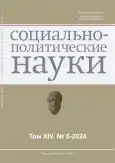Модель системы социальной помощи осужденным, отбывающим наказание в пенитенциарных учреждениях России
- Авторы: Боричевская Е.И.1
-
Учреждения:
- Финансовый университет при Правительстве Российской Федерации
- Выпуск: Том 14, № 5 (2024)
- Страницы: 179-185
- Раздел: Социология управления
- URL: https://bakhtiniada.ru/2223-0092/article/view/282494
- DOI: https://doi.org/10.33693/2223-0092-2024-14-5-179-185
- EDN: https://elibrary.ru/SNZBNM
- ID: 282494
Цитировать
Аннотация
Цель исследования. В статье рассматриваются показатели, отражающие прямые и косвенные результаты социальной работы с осужденными. Вместе с тем, в работе отмечается, что несмотря на нормативно-правовую базу, в которой указаны мероприятия по работе с данной категорией индивидов, в настоящее время в законодательстве отсутствуют конкретные показатели эффективности социальной работы с осужденными. Отсутствие четких и измеримых показателей эффективности такой работы порождает ряд проблем. Как показывают различные социологические исследования и ведомственная статистика, на сегодняшний день доля повторных преступлений составляет 68%. Такой процент указывает на то, что общество до сих пор сталкивается с серьезной проблемой рецидива, тем самым подчеркивая не эффективность сложившейся социальной работы с осужденными.
Выводы. На основе проведенного исследования выявлены показатели, определяющие эффективность социальной работы с осужденными. Автор делает вывод, что специфика российской пенитенциарной системы требует трансформации и предлагает авторскую методику оценки эффективности социальной работы с осужденными, которая учитывает как прямые результаты проводимых мер, так и косвенные эффекты ресоциализации. Важно отметить, что оценка такой работы должна быть комплексной и учитывать различные показатели, поскольку важно получить достоверную информацию о результативности проводимых мер и внести необходимые коррективы в работу социальных служб.
Полный текст
Открыть статью на сайте журналаОб авторах
Елизавета Игоревна Боричевская
Финансовый университет при Правительстве Российской Федерации
Автор, ответственный за переписку.
Email: eiborichevskaya@fa.ru
ORCID iD: 0000-0001-7116-4035
младший научный сотрудник, Институт гуманитарных технологий и социального инжиниринга, ассистент, кафедра социологии, факультет социальных наук и массовых коммуникаций
Россия, г. МоскваСписок литературы
- Бровкина А.А., Корнеев С.А. Ресоциализация осужденных как цель уголовного наказания // Вестник Уральского юридического института МВД России. 2020. № 1. С. 97–102.
- Геранин В.В., Мальцева С.Н. Проблемы функционирования исправительных центров и колоний-поселений в системе уголовных наказаний // Человек: преступление и наказание. 2021. № 1. С. 64–68.
- Грязнов С.А. Проблема ресоциализации осужденных // Основы экономики, управления и права. 2020. № 3. С. 47–49.
- Демидочкина М.Ю., Анфиногенов В.А. Общение как важное условие исправительного воздействия на осужденных // Гуманитарные, социально-экономические и общественные науки. 2019. № 2. С. 32–53.
- Ежова О.Н. Влияние служебной деятельности на личность сотрудников исправительных колоний с различным режимом // Вестник Самарского юридического института. 2018. № 3 (29). С. 22–32.
- Еремеева А.А. Характеристика социальных сетей осужденных // Вестник ПНИПУ. Социально-экономические науки. 2020. № 1. С. 45–53.
- Корнилова Т.В., Поздняков В.М., Баламут А.Н. Исследование жизнестойкости осужденных, отбывающих пожизненное лишение свободы в исправительной колонии особого режима // Пенитенциарная наука. 2021. № 1. С. 43–56.
- Куркина И.Н., Соколова Ю.А. Особенности ресоциализации осужденных женщин, отбывающих наказание в виде лишения свободы // Ведомости уголовно-исполнительной системы. 2020. № 2. С. 9–15.
- Лакомова А.А. Технологии социальной работы с лицами мужского пола, отбывающими наказание в исправительных колониях строгого режима // Наука. Мысль: электронный периодический журнал. 2016. № 12. С. 48–54.
- Луковкин К.Е. Колония городского типа как новый тип исправительного учреждения // Уголовно-исполнительное право. 2019. № 2. С. 78–112.
- Самойлова А.А. К вопросу о правовой регламентации условий и правил отбывания наказания в исправительных колониях для осужденных женщин // Журнал прикладных исследований. 2021. № 2. С. 15–34.
- Тепляшин П.В., Сергиенко А.С. Роль феномена выученной беспомощности в ресоциализации осужденных, изолированных от общества // Научный компонент. 2020. № 1. С. 68–73.
Дополнительные файлы








